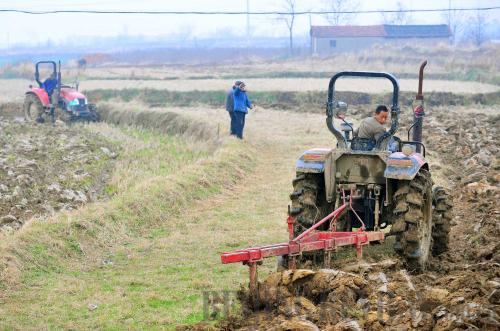|
 |
|
BUSY FARMING: Farmers from Hubei Chunhui Farming Cooperative, which is established for realizing agricultural scale operation, prepare for spring plowing in Xiaogan of central China's Hubei Province on March 7 (XIAO YIJIU) |
When it comes to income, the average Chinese person has a lot to complain about. "I've been working for 25 years since graduating in 1987, but I'm only earning 1,200 yuan ($190) a month," said an anonymous netizen posting on People's Daily Online. The media outlet conducted a survey soliciting public opinion before the annual sessions of the National People's Congress (NPC) and the National Committee of the Chinese People's Political Consultative Conference (CPPCC).
The People's Daily Online survey showed that "income distribution" ranked second in a list of the nation's top 10 concerns. Xinhua News Agency's web portal conducted a similar survey, with "narrowing income disparities" ranking first.
On March 5, when delivering the government work report, Chinese Premier Wen Jiabao said more efforts should be made to deepen income distribution reform in 2012. Wen's words aroused heated discussion among participants of the NPC and CPPCC sessions.
"Income distribution is a key issue that everyone pays attention to," said Sun Xiaoyu, former Vice President of the Development Research Center of the State Council (DRC) and head of a research team on income distribution reform at the economic affairs committee of the CPPCC National Committee. "Reform of the income distribution is an urgent task for China."
Government departments and enterprises occupy the lion's share of the national income and the proportion of individual income to national income has fallen year on year.
The continuous decrease of individual income proportion is an inevitable outcome of China's economic development and industrialization, said Zhang Xiaoji, a member of the CPPCC National Committee and Director of Research Department of Foreign Economic Relations of the DRC.
However, the government's large proportion should be given back to residents through the transfer payment system. Last year, China raised the monthly tax exemption threshold to transfer part of the government income back to the people, said Zhang.
The enterprises' proportion is also too large, said Liu Kegu, a member of the National Committee of the CPPCC and former Vice President of China Development Bank. There are abnormal causes for this result, such as windfall profits of monopolized sectors, excessive income of resource sectors and a low proportion of profits contributed to the government by state-owned enterprises (SOEs).
Liu suggests the Central Government should levy more taxes on companies with higher profit margins. It should also enhance the level of the minimum profit that SOEs must hand over to the government. If necessary, part of the operating income of state-owned capital should be earmarked for the nation's social security.
The income gap exists between the rich and the poor, between urban and rural areas, and between different industries or regions.
"The difference between wages in western and eastern regions is way too big," said the anonymous netizen, whose IP address is from southwest China's Sichuan Province. "I earn far less than my peers in the east." Statistics show per-capita disposable income of urban residents in Sichuan was 17,899 yuan ($2,828) in 2011. In striking contrast, per-capita disposable income of urban residents in Jiangsu Province at the east coast reached 26,341 yuan ($4,162) in 2011.
Regional income disparities have become a common concern among most Chinese, said Shang Xunwu, a member of the CPPCC National Committee and former Deputy Director of the Agriculture and Animal Husbandry Department of northwest China's Gansu Province.
"The income gap between developed regions and less developed ones is so large that talented people tend to flow to high-income regions. It's quite hard for remote areas to attract or keep high-caliber talent," said Shang.
Rubbing salt into the wounds is the income gap between rural and urban areas. Urban residents' disposal income against farmers' net income was 3.13:1 in 2011, according to the National Bureau of Statistics, with per-capita farmers' net income around 6,977 yuan ($1,107).
"Not enough public finance is earmarked for rural areas. If we take into consideration the public services that residents are entitled to, the income of urban residents is six times that of rural people. Public services include transportation, water supply, electricity supply, education, and medical and health care services," said Shang.
| 